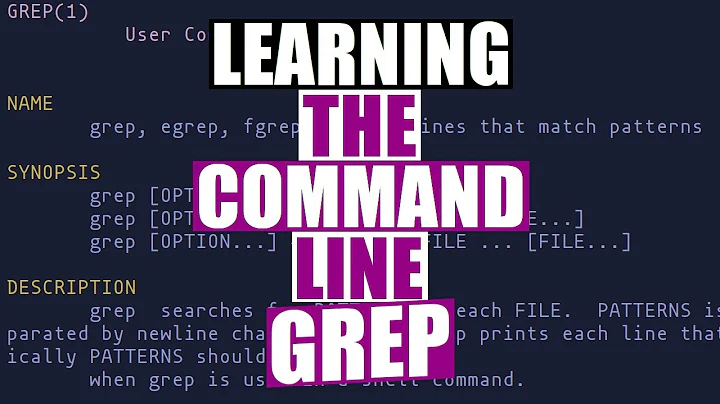Search for special characters using grep
Solution 1
grep "[]:/?#@\!\$&'()*+,;=%[]"
Within a bracketed expression, [...], very few character are "special" (only a very small subset, like ], - and ^, and the three combinations [=, [: and [.). When including ] in [...], the ] must come first (possibly after a ^). I opted to put the ] first and the [ last for symmetry.
The only other thing to remember is that a single quoted string can not include a single quote, so we use double quotes around the expression. Since we use a double quoted string, the shell will poke around in it for things to expand. For this reason, we escape the $ as \$ which will make the shell give a literal $ to grep, and we escape ! as \! too as it's a history expansion in bash (only in interactive bash shells though).
Would you want to include a backslash in the set, you would have to escape it as \\ so that the shell gives a single backslash to grep. Also, if you want to include a backtick `, it too must be escaped as \` as it starts a command substitution otherwise.
The command above would extract any line that contained at least one of the characters in the bracketed expression.
Using a single quoted string instead of a double quoted string, which gets around most of the annoyances with what characters the shell interprets:
grep '[]:/?#@!$&'"'"'()*+,;=%[]'
Here, the only thing to remember, apart from the placing of the ], is that a single quoted string can not include a single quote, so instead we use a concatenation of three strings:
'[]:/?#@!$&'"'"'()*+,;=%[]'
Another approach would be to use the POSIX character class [[:punct:]]. This matches a single character from the set !"#$%&'()*+,-./:;<=>?@[\]^_`{|}~, which is a larger set than what's given in the question (it additionally contains "-.<>^_`{|}~), but is all the "punctuation characters" that POSIX defines.
LC_ALL=C grep '[[:punct:]]'
Solution 2
You can use [:punct:] character class if you don't mind that it also matches other punctuation and special characters:
grep '[[:punct:]]' file
Solution 3
You can use full regex to find special characters inside of square brackets if your looking for one character that is a special character. A great resource practicing, learning and checking your Regular Expression is regex101.com.
This uses Perl regular expressions, which can be used with GNU grep with the -P option:
grep -P "(\:|\/|\?|\#|\@|\!|\\$|\&|\'|\(|\)|\*|\+|\,|\;|\=|\%|\[|\])"
^^^
Note that you need two backslashes in front of the dollar sign, as it has a special meaning in the shell, and the first backslash will escape it for the shell. (With just one backslash in front, the shell would remove the backslash, grep would see an unescaped dollar sign meaning end of line, and match any input line.)
If your terminal supports colors, throw colors on as well,
grep --color=auto -P "(\:|\/|\?|\#|\@|\!|\\$|\&|\'|\(|\)|\*|\+|\,|\;|\=|\%|\[|\])"
Here is the explanation of my regex from regex101.com
/(\:|\/|\?|\#|\@|\!|\$|\&|\'|\(|\)|\*|\+|\,|\;|\=|\%|\[|\])/gm 1st Capturing Group (\:|\/|\?|\#|\@|\!|\$|\&|\'|\(|\)|\*|\+|\,|\;|\=|\%|\[|\]) \: matches the character : literally (case sensitive) \/ matches the character / literally (case sensitive) \? matches the character ? literally (case sensitive) \# matches the character # literally (case sensitive) \@ matches the character @ literally (case sensitive) \! matches the character ! literally (case sensitive) \$ matches the character $ literally (case sensitive) \& matches the character & literally (case sensitive) \' matches the character ' literally (case sensitive) \( matches the character ( literally (case sensitive) \) matches the character ) literally (case sensitive) \* matches the character * literally (case sensitive) \+ matches the character + literally (case sensitive) \, matches the character , literally (case sensitive) \; matches the character ; literally (case sensitive) \= matches the character = literally (case sensitive) \% matches the character % literally (case sensitive) \[ matches the character [ literally (case sensitive) \] matches the character ] literally (case sensitive)
Related videos on Youtube
user9371654
Updated on September 18, 2022Comments
-
 user9371654 over 1 year
user9371654 over 1 yearI want to search for the lines that contains any of the following characters:
://?#[]@!$&'()*+,;=% -
 Kusalananda over 5 years@ilkkachu I didn't spot the
Kusalananda over 5 years@ilkkachu I didn't spot the$in there! Thanks! -
 user9371654 over 5 yearsWhen I try to execute the command, I get this error
user9371654 over 5 yearsWhen I try to execute the command, I get this errorbash: !\: event not found. -
 Kusalananda over 5 years@user9371654 Darn
Kusalananda over 5 years@user9371654 Darnbash! :-) Escape the!too... Not being abashuser I forgot about that. I will update... -
 Kusalananda over 5 yearsThe
Kusalananda over 5 yearsThepunctcharacter class (not macro) matches!"#$%&'()*+,-./:;<=>?@[\]^_{|}~` in the C locale, which is a slightly larges set of characters than what the user has, but it may be good enough. -
 Kusalananda over 5 years@ilkkachu No, you can't put a single quote in a single quoted string like that. you would have to use
Kusalananda over 5 years@ilkkachu No, you can't put a single quote in a single quoted string like that. you would have to use'...'"'"'...'. I will make a note about it. -
 Kusalananda over 5 years@ilkkachu Ah, I see. I opted for a double-quoted
Kusalananda over 5 years@ilkkachu Ah, I see. I opted for a double-quoted'instead. -
 Stéphane Chazelas over 5 years
Stéphane Chazelas over 5 years"[\!]"expands to[\!]even when history expansion is enabled, so would match on backslash. You'd need single quotes or using\!outside of quotes. -
 Stéphane Chazelas over 5 yearsNo, with standard ERE, you can't escape the closing
Stéphane Chazelas over 5 yearsNo, with standard ERE, you can't escape the closing]with backslash. backslash is not special inside bracket expressions. To have a]inside a bracket expression, it needs to be first:[]other], not[ot\]her]. That's different from PCREs which regex101 describe by default. -
 ilkkachu over 5 yearsIt would work with
ilkkachu over 5 yearsIt would work withpcregrepor GNUgrep -P, though. And in a sense, the Perl behaviour is more straightforward: a backslash always makes a special character normal. -
thebtm over 5 yearsCorrected to -P, sorry about that, i get the -E and -P mixed up
-
 Stéphane Chazelas over 5 yearsNote that it's not only
Stéphane Chazelas over 5 yearsNote that it's not onlybash,zshalso has that annoying feature inherited from csh. in csh,!special inside'...'as well, and also when non-interactive. However incsh(contrary to bash or zsh), using"\!"would work here (the backslash is removed). -
lampShadesDrifter over 3 yearsI was using
cpdfto add bookmarks and getting aBad bookmark file (syntax) at line 0error. This post helped me find the bad chars. (Hopefully this comment helps this post get picked up in search for others with this problem).




